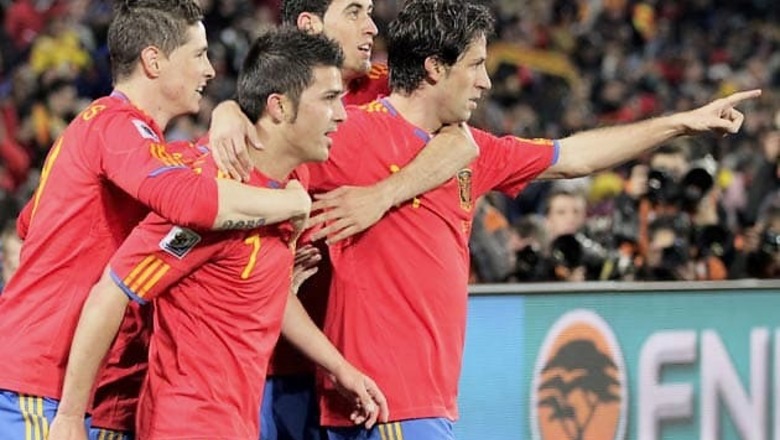
views
Johannesburg: Sunday's eagerly-awaited World Cup final between Holland and Spain will, remarkably, be the first ever competitive meeting between these two nations; yet they are inextricably linked by their shared footballing philosophy - a tactical approach attributable to two Dutchmen, Rinus Michels and Johan Cruyff, and their profound influence on two clubs, Ajax and Barcelona.
The two squads from whom a new name will be inscribed on the World Cup this weekend include no fewer than 17 players who graduated from the academies of these two great clubs, which is to say that all 17 were schooled in their formative years in the fluid and highly flexible style known as 'Total Football'.
That was the label given to the system in which any outfield player can seamlessly assume the role of any other in the team - an approach embodied in successive Ajax, Holland, Barcelona and Spain teams, and one which could provide a feast for football purists on Sunday.
Some argue that the genesis of Total Football was the great Hungary team of the early 1950s, who are credited with re-inventing the game after the Second World War. They have a strong case; and it is no coincidence that the international record set by those Magical Magyars - of 32 consecutive matches without defeat - was only beaten, in June 2009, by the current Spain team.
But the version of Total Football developed by Ajax and later Barcelona had its origins in Amsterdam. Englishman Jack Reynolds, manager of Ajax Amsterdam from 1915–1925, 1928–1940, and 1945-1947, first experimented with it. One of his players in his last spell at the club was Michels, and he is the man who famously pioneered and refined it when he himself turned to coaching.
Under Michels, Ajax played some of their best ever football, winning the Dutch league four times and cup three times between 1965 and 1971, and also lifting the first of three consecutive European Cups. His great on-field orchestrator was the incomparable Johan Cruyff. The pair also worked together at Barcelona - Michels joining the Catalans in 1971 and Cruyff in 1973 - and with the Dutch national team, who dazzled the world with Total Football at the 1974 World Cup and are still regarded as the best team never to have won the trophy.
In Cruyff's vision of Total Football, which was further refined when he became coach of Ajax (1985-88) and Barcelona (1988-96), and which is evident today in the way both 2010 World Cup finalists play, space is everything. An Ajax team-mate of Cruyff's, Barry Hulshoff, once explained: "We discussed space the whole time. Johan Cruyff always talked about where people should run and where they should stand, and when they should not move."
In 1987 Ajax won the European Cup again under Cruyff; and when he emulated Michels by becoming coach of Barca, he assembled the fabled 'Dream Team'. Under Cruyff's guidance, Barca won four consecutive La Liga titles from 1991 to 1994 and beat Sampdoria in both the 1989 Cup Winners' Cup final and the 1992 European Cup final - the latter with a free kick by Dutch international Ronald Koeman, which reflected the growing Dutch influence at Barca.
From Barca to Spain
Winning 11 trophies, Cruyff became Barcelona's most successful and longest serving manager to date. Perhaps most significantly, in building the Dream Team he recruited Pep Guardiola, whose successful playing career has been followed by an even more successful coaching career, in which the legacy of the Michels-Cruyff brand of Total Football is dazzlingly apparent. The current Spain squad is packed with players under Guardiola's tutelage at club level who came through the Barca academy: Victor Valdes, Gerard Pique, Carles Puyol, Sergio Busquets, Xavi Hernandez, Andres Iniesta and Pedro Rodriguez, with Cesc Fabregas having begun his footballing education at Camp Nou, where he modelled his game on Guardiola’s.
The Ajax contribution:
Meanwhile the Ajax youth programme remains one of the most vibrant and productive in world football. In 1995, when Ajax won the Champions League, the Dutch national team was composed almost entirely of their players, including Edwin van der Sar, Michael Reiziger, Frank de Boer, Danny Blind, Ronald de Boer, Edgar Davids, Clarence Seedorf, Patrick Kluivert and Marc Overmars. Several of those stars also went on to represent Barcelona with distinction.
Heirs to the legacy created by these players and the likes of Cruyff, Marco van Basten, Frank Rijkaard and Dennis Bergkamp can be found throughout the current Oranje squad. Wesley Sneijder, Rafael van der Vaart, Klaas-Jan Huntelaar, Eljero Elia, John Heitinga, Nigel de Jong, Maarten Stekelenburg, Gregory van der Wiel and Ryan Babel all came through the ranks at Ajax.
The 2010 World Cup final will, therefore, be something of an affirmation that the Total Football philosophy born some 40 years ago in Amsterdam has been nurtured over a couple of generations and flourished in the academies of two famous clubs to the benefit of two distinctive national teams. And when of those nations lifts the trophy for the first time on Sunday, attacking football will be the winner.


















Comments
0 comment